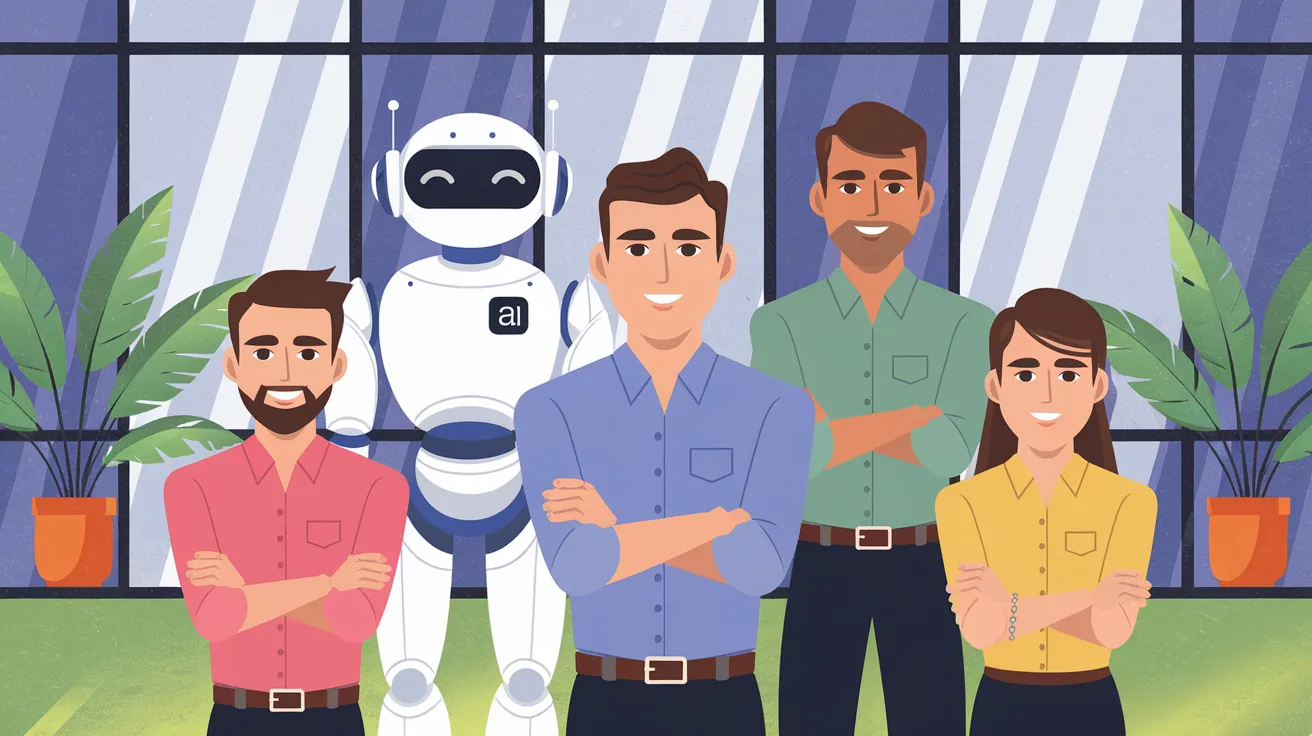Bots: Your guide to AI digital workers in 2025
Looking to streamline your business? Discover how AI digital workers can revolutionize your workflow, boost productivity, and cut costs in 2025. See real results today
Posted by


Anastasiya Dovhopola
Product Growth Manager
Bots: Your Guide to AI Digital Workers 2025
Did you know 56% of workers already use generative AI at work? That's right, almost 1 in 10 employees use AI tools every day. As we get closer to 2025, work is changing fast, with AI digital workers playing a big role.
I'm here to help you understand this exciting change. We're seeing a big shift in how work gets done, thanks to intelligent automation. These digital workers, from AI assistants to robotic tools, are becoming our team members.
In this guide, we'll look at how these AI digital workers will change industries by 2025. We'll talk about what they can do, how they're used in real life, and their effect on businesses. Whether you run a business, manage a team, or work for someone else, knowing about this change is key to staying ahead.

Get ready to see a world where AI and humans work together. This will make work better and change the office as we know it. Let's start this journey to see what the future of work looks like in 2025 and beyond.
Key Takeaways
- 56% of workers currently use generative AI in their jobs
- AI digital workers are becoming integral to modern workplaces
- Intelligent automation is reshaping business operations
- Understanding AI integration is crucial for future competitiveness
- The guide will explore AI capabilities and real-world applications
- We'll examine the impact of AI on various industries by 2025
Understanding the Evolution of Workplace Automation
Workplace automation has changed a lot over the years. It has moved from simple tasks to complex operations. This journey has been truly remarkable.
From Simple Automation to Intelligent Systems
At first, automation was just for simple tasks. Now, we have advanced systems thanks to AI automation and AI agents. These smart systems can make complex decisions and change how we work.
Current Market Growth and Adoption Rates
The market for conversational AI and virtual assistants is growing fast. It's expected to jump from $396.2 million in 2019 to $27.3 billion by 2030. Companies like Salesforce are already using AI for tasks like predicting sales and completing tasks.
Impact on Business Operations
AI is changing how businesses operate. It helps reduce workloads, cuts down on mistakes, and speeds up tasks. For example, Cognition's Devin handles complex engineering tasks with thousands of decisions. Hachly AI works all day to turn website visitors into sales leads.
But, there are still challenges. Many leaders doubt AI's trustworthiness, seeing it as unreliable. The backlash against Lattice's AI initiative shows the ongoing debate about AI's place in work.
As we look ahead, finding the right mix of human skills and AI is key. The future of workplace automation is promising. But, we must navigate it carefully to fully benefit from it.
The Rise of AI Digital Workers
AI digital workers are changing the workplace. They use natural language processing and machine learning to do tasks humans used to do. A Capgemini survey found 82% of tech leaders plan to use AI agents within three years.
Defining Digital Workforce Capabilities
Digital labor can do many jobs. It can crunch numbers and answer customer questions. These AI assistants work all the time and don't need breaks. By 2025, they will make up about 30% of the workforce in tech industries.
Integration with Existing Business Systems
Adding AI to the workplace needs careful planning. But the benefits are huge. Companies using AI see task times drop by up to 50%.
Real-world Implementation Cases
Let's look at some success stories. In customer service, AI will handle over 50% of interactions by 2026. This means faster answers and happier customers. In finance, AI is making invoice processing 50% faster. Even small businesses are getting in on AI, with 40% planning to use it by 2025.
Industry | AI Implementation | Expected Impact |
|---|---|---|
Customer Service | AI-powered chatbots | 70% of inquiries handled without human intervention |
Human Resources | AI recruitment tools | 30% decrease in recruitment costs |
Marketing | AI-driven targeting | 30% boost in revenue |
The rise of AI digital workers is changing how we work. As these smart assistants become more common, we're seeing a shift towards a blended human-AI workforce. It's an exciting time, full of opportunities for those ready to embrace the change.
Transformative Power of Intelligent Automation
I'm excited to explore the world of intelligent automation. It's changing how we work, making us more productive and creative. About half of all work activities could be automated!
Chatbots are revolutionizing customer service. They work around the clock, answering questions and letting humans handle the tough stuff. In finance, smart systems are making loan approvals and risk checks faster. This makes customers happier and operations smoother.
MLM are the brains behind these changes. They analyze data, find patterns, and make smart choices. In retail, they predict what customers want before they even know it. This helps stores stock the right items at the right time.
Data mining is another key tool. It turns raw data into valuable insights for businesses. Insurance companies use it to adjust policies based on weather risks. Retailers use it to improve their inventory. It's all about making smarter choices.
Automation Impact | Percentage |
|---|---|
Activities that could be automated | 50% |
Decrease in operational costs | 30% |
Increase in efficiency | 25% |
Large enterprises using intelligent automation by 2025 | 50% |
The future looks bright for intelligent automation. It's not just about robots doing our jobs. It's about humans and machines working together, each doing what they do best. That's the real power of this transformation.
Digital Employee Experience (DEX) in 2025
I'm excited to explore the future of work in 2025. The digital employee experience is set to change how we work with artificial intelligence. Let's dive into the key aspects shaping this transformation.
Cloud-based Solutions and Remote Work
In 2025, cloud-based solutions will be key for remote work. Virtual AI employees will work smoothly with current systems. This makes AI workforce automation efficient. A recent survey shows 80% of IT leaders now see DEX as a top priority.
Employee Training and Adaptation

Training for human employees will be tailored and adaptive. AI-powered platforms will spot skill gaps and offer specific learning. This helps workers better work with artificial intelligence assistants.
Performance Metrics and Success Indicators
By 2025, measuring performance will be more advanced. Companies using digital workers can expect:
- 176% return on investment
- Revenue growth of $968,000
- 60% less time on tasks like invoice processing
- Up to 100% accuracy in invoice processing
These metrics show AI's power in changing work. As businesses use more virtual AI employees, work will change a lot.
Human-AI Collaboration Framework
I've seen a big change in how we work with intelligent process automation leading the way. The use of cognitive AI workers is changing our jobs and how we use technology.
Redefining Workplace Roles
AI is changing old job roles. Now, humans focus on creative and emotional tasks. AI does the data work that's repetitive. This means we can work 24/7, which is great for customer service in e-commerce and finance.
Skills Development for the AI Era
To do well in this new world, we need skills that match AI's. Skills like critical thinking, problem-solving, and emotional intelligence are key. We must keep learning to stay up with new tech.
Building Effective Hybrid Teams
Creating great teams with humans and AI means knowing their strengths. AI is good at data and patterns, while humans are creative and make nuanced decisions. The goal is to find the right mix.
The future of work is not about humans versus machines, but humans and machines working together to achieve better outcomes.
Studies show 81% of workers think AI makes them better at their jobs. This positive view is key for working well with AI.
Collaboration Aspect | Human Role | AI Role |
|---|---|---|
Decision Making | Strategic thinking, ethical considerations | Data analysis, pattern recognition |
Customer Service | Complex issue resolution, empathy | 24/7 availability, quick query resolution |
Creative Tasks | Ideation, original content creation | Content optimization, trend analysis |
By working together, we can achieve more in the workplace. The future is for those who use human creativity and AI well together.
Overcoming Implementation Challenges
Implementing AI digital workers is not easy. Businesses face many hurdles when using AI task automation and workforce augmentation. Let's look at some common challenges and how to solve them.
Data quality is a big problem. Companies often struggle to find their data, which is key for AI. They need a centralized data repository. Bad data can really slow down AI, showing how important data is for AI success.

Resistance to change is another big issue. Many organizations resist AI adoption. To overcome this, I suggest using change management strategies. Teaching employees about AI benefits and involving them in the process can help.
The AI skills gap is huge. There's a lot of competition for AI experts. To solve this, consider training current staff or working with AI consultants. Companies that use AI strategy consulting see a 50% increase in success.
Challenge | Solution |
|---|---|
Data Quality Issues | Implement centralized data repository |
Resistance to Change | Focus on change management and employee education |
AI Skills Gap | Upskill existing staff or partner with AI consultants |
By tackling these challenges, businesses can fully benefit from AI. The journey might be hard, but the benefits are worth it.
Conclusion
We've explored the world of ai digital workers and intelligent automation. The future of work is changing fast. Robotic process automation is changing how businesses work, offering 24/7 service and handling many tasks at once.
In the UK, there's growing interest in these digital helpers. A survey showed 66% of full-time workers want AI solutions from their employers. This makes sense, given the benefits. Digital workers don't need breaks, they don't leave after training, and they can cut hiring costs.
By 2025, I see a workplace where humans and AI work together. Intelligent automation will handle routine tasks, letting people focus on creative and complex problems. It's an exciting time, full of opportunities for growth and innovation. We need to start preparing now, embracing these changes while keeping a human-centered approach to business.
FAQ
What are AI digital workers?
AI digital workers are advanced software systems. They use artificial intelligence to do tasks humans used to do. They can handle complex tasks, make decisions, and learn from experience.
How are AI digital workers different from traditional automation?
AI digital workers are different because they use machine learning. This means they can adapt and improve over time. They can handle unstructured data and make complex decisions, unlike traditional automated systems.
What industries are most likely to benefit from AI digital workers?
Many industries can benefit from AI digital workers. But, finance, healthcare, retail, and customer service will see the biggest impact. As the technology grows, more industries will use AI digital workers.
Will AI digital workers replace human employees?
AI digital workers aim to help, not replace humans. They take over routine tasks, letting humans focus on creative and strategic work. The future workplace will be a mix of humans and AI working together.
What skills will be important for working alongside AI digital workers?
Skills like critical thinking, creativity, and problem-solving will be key. Knowing how to work with AI and make decisions based on its insights will also be important.
How can businesses prepare for the integration of AI digital workers?
Businesses should start by identifying where AI can help. They need to invest in infrastructure and train employees. It's also important to have a clear strategy and consider ethical implications.
What are some challenges in implementing AI digital workers?
Challenges include employee resistance and data security concerns. There's also a need for significant investment and integrating AI with existing systems. Ensuring AI is ethical and unbiased is crucial.
How will AI digital workers impact the customer experience?
AI digital workers can offer 24/7 support and personalized interactions. They can handle routine inquiries, freeing human agents for complex needs. But, it's important to ensure human support is still available when needed.
What role will cloud-based solutions play in the future of AI digital workers?
Cloud-based solutions will be key for AI digital workers. They make updates easier and allow for better integration. Cloud solutions also support remote work and collaboration, which will be important in 2025.
How can businesses measure the success of their AI digital workforce?
Success can be measured by productivity gains, cost savings, and improved accuracy. It's also important to look at less tangible benefits like better decision-making and employee satisfaction. Regular audits and reviews of AI systems are crucial.
Need more leads from website?
Start free plan today and get your first chatbot up and running in the next 30 minutes!
Sign Up Now